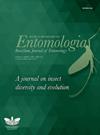A 3D model to illustrate the nest architecture of Acromyrmex balzani (Hymenoptera; Formicidae)
IF 0.7
4区 农林科学
Q4 ENTOMOLOGY
引用次数: 0
Abstract
ABSTRACT For eusocial insects, the nest is a place where the main social interactions occur. The nest architecture ensures protection from predators and the environment, as well as suitable conditions for brood rearing, food storage, and in some cases the cultivation of fungus farms. Variations in nest architecture can occur, according to the environmental conditions. In order to elucidate the internal organization of nests, most studies use 2D schemes and photographs to illustrate the nest architecture models. However, 3D models can provide a different and more realistic view of the nest architecture. The aim of this study was to describe the nest architecture and colony size of the grass-cutting ant Acromyrmex balzani (Emery), using 3D models to illustrate these features. The structures of eight colonies were measured and the data were used to create a 3D model of each nest. Externally, the nests had one or more piles of loose soil and waste, with a single straw turret over the entrance. Underground, the nests had from 2 to 6 chambers, at a maximum depth of 122 cm. It could be concluded that the observed nest architecture of Acromyrmex balzani followed, at least in part, the pattern already reported in the literature. However, this is the first report of connection between two chambers made by two shafts, as well as the presence of the turret at the nest entrance/exit, regardless of the season of the year. These differences evidence that the nest structures may vary, depending on intrinsic or local environmental conditions.膜翅目蜂窝蜂(Acromyrmex balzani)巢结构的三维模型;蚁科)
对于真社会性昆虫来说,巢是主要的社会互动发生的场所。巢结构确保了对捕食者和环境的保护,以及适宜的育雏、食物储存条件,在某些情况下还可以种植真菌农场。根据环境条件,巢架构可能会发生变化。为了阐明巢的内部组织,大多数研究使用二维方案和照片来说明巢的建筑模型。然而,3D模型可以提供不同的、更真实的巢结构视图。本研究的目的是描述割草蚁Acromyrmex balzani (Emery)的巢结构和群体规模,使用3D模型来说明这些特征。测量了8个蚁群的结构,并利用这些数据创建了每个蚁巢的3D模型。在外部,鸟巢有一堆或多堆松散的土壤和废物,入口处有一个稻草塔。在地下,巢有2到6个室,最大深度为122厘米。可以得出结论,观察到的Acromyrmex balzani的巢结构至少部分遵循了文献中已经报道的模式。然而,这是第一次有报告称两个房间之间由两个轴连接,以及在鸟巢的入口/出口存在炮塔,无论一年中的季节如何。这些差异表明,巢的结构可能会有所不同,这取决于内在或当地的环境条件。
本文章由计算机程序翻译,如有差异,请以英文原文为准。
求助全文
约1分钟内获得全文
求助全文
来源期刊
CiteScore
1.50
自引率
12.50%
发文量
14
审稿时长
6-12 weeks
期刊介绍:
Information not localized

 求助内容:
求助内容: 应助结果提醒方式:
应助结果提醒方式:


